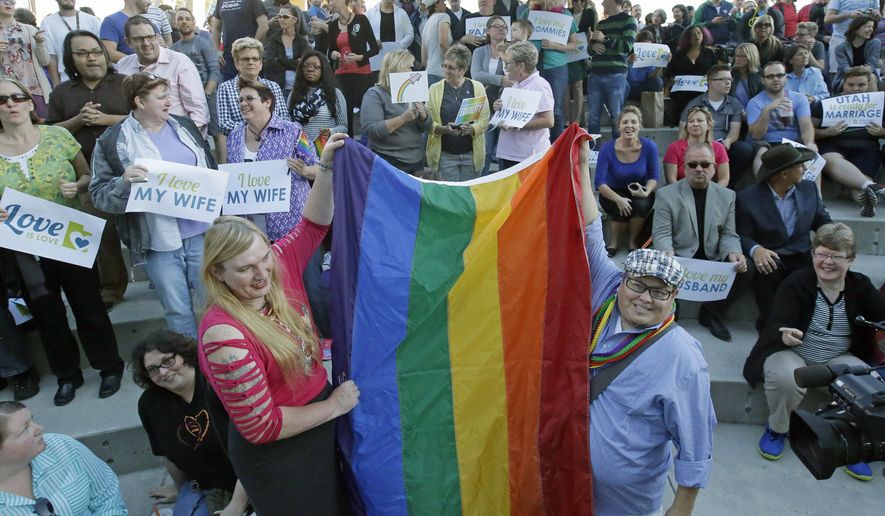Despite a rebuff from the Supreme Court, officials in states that oppose gay marriage vowed Tuesday to keep up the fight, with at least three court battles scheduled before the end of the month.
That determination came even as gay marriage supporters racked up another win Tuesday, as the 9th Circuit Court issued a ruling knocking down marriage amendments in Idaho and Nevada. In line with a string of other lower-court rulings, the court found that Idaho and Nevada’s laws restricting legal marriage to one man and one woman violate the 14th Amendment on the basis of equal protection.
The Supreme Court’s decision not to take up the gay marriage challenges, issued without comment Monday, effectively struck down traditional marriage laws and statutes in five states — Virginia, Utah, Oklahoma, Indiana and Wisconsin — leading to a rush of same-sex couples to obtain marriage licenses within hours.
But five other states — North Carolina, South Carolina, West Virginia, Kansas and Wyoming — did not agree to license gay couples, and officials say they still plan on defending their state laws as far as they can. They noted the justices also rejected the option of taking the cases from the lower courts and affirmatively ruling gay marriage was a constitutional right.
North Carolina Gov. Pat McCrory said Monday, “I disagree with the Supreme Court’s decision, which goes against the amendment that North Carolina voters overwhelmingly approved. We will continue to respect the legal process as it proceeds.”
North Carolina Attorney General Roy Cooper, a Democrat, has declined to defend the state’s gay marriage prohibition, but this week, House Speaker Thom Tillis and Senate President Pro Tempore Phil Berger, both Republicans, said they would file papers to intervene in the case to defend the law.
Tami Fitzgerald, executive director of North Carolina Values Coalition, which supported the 2012 traditional marriage amendment, applauded the actions by Mr. Tillis, who is running for U.S. Senate, and Mr. Berger. “People of North Carolina deserve to have their views defended in court, since they voted by 61 percent just two years ago to pass the marriage amendment,” she said Tuesday.
In South Carolina, GOP Gov. Nikki Haley said through spokesman Doug Mayer that she agrees with state Attorney General Alan Wilson that “our voter-approved state law should be followed until a court rules on it directly.”
Mr. Wilson said Monday that the state’s gay marriage case, Bradacs v. Wilson, “has not yet been decided.”
“Until the courts rule on the matter, South Carolina will seek to uphold our state constitution,” he said in a statement. A spokesman for Mr. Wilson did not have an update on Tuesday.
States that continue to oppose same-sex marriages have a right to demand their own Supreme Court review, said constitutional expert John C. Eastman, who is also chairman of the National Organization for Marriage, which opposes gay marriage.
The Supreme Court is clear that denying review of a case “is not a judgment on the merits and shouldn’t be interpreted as such,” said Mr. Eastman. “North Carolina did not litigate its cases. They should have as much right to petition the Supreme Court for review as Virginia has.”
As states pursue these cases — especially if there are decisions from other lower-court circuits that would break with the consensus so far in favor of gay marriage — there is a likelihood that the high court “would hear these cases,” said Mr. Eastman, who is a constitutional law professor at Chapman University in California.
West Virginia Attorney General Patrick Morrisey said he would defend the state’s marriage law and is “evaluating [our] next steps,” spokeswoman Beth G. Ryan said Tuesday.
Allen Whitt, president of the Family Policy Council in West Virginia, said his group would “go forward” with efforts to seek a constitutional marriage amendment. “Marriage has always been — and will always be — between a man and a woman. Ultimately, no court can change that truth,” he said.
• Cheryl Wetzstein can be reached at cwetzstein@washingtontimes.com.




Please read our comment policy before commenting.